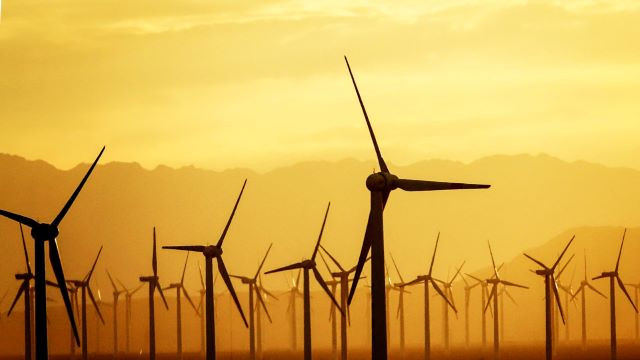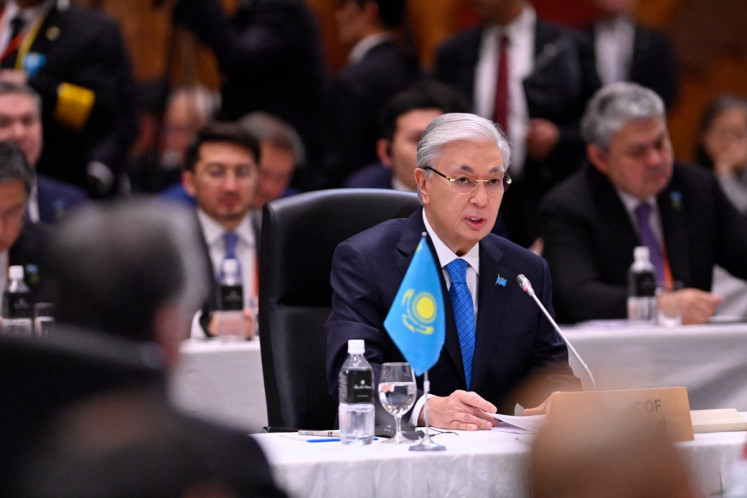Popular Reads
Top Results
Can't find what you're looking for?
View all search resultsPopular Reads
Top Results
Can't find what you're looking for?
View all search resultsChina leads nations with new climate plans, defying US climate denial
China's reduction target marked the first time the world's biggest emitter pledged a cut in emissions, rather than just limiting their growth, though the reduction was less than many observers had expected.
Change text size
Gift Premium Articles
to Anyone
C
hina led several countries in announcing new climate plans on Wednesday and offered a veiled rebuke of the US president's anti-climate rhetoric a day earlier at the UN General Assembly.
Addressing a climate leaders’ summit hosted by UN Secretary-General Antonio Guterres, Chinese President Xi Jinping said in a live video message from Beijing that by 2035 his country would cut its greenhouse gas emissions by 7 percent to 10 percent from its peak.
In addition, Xi said China planned to increase its wind and solar power capacity by six times from its 2020 levels within the next 10 years – helping to boost its share of non-fossil fuels in domestic energy consumption to over 30 percent.
China's reduction target marked the first time the world's biggest emitter pledged a cut in emissions, rather than just limiting their growth, though the reduction was less than many observers had expected.
Xi urged stronger climate action from the world's developed countries. He referred, though not by name, to the United States for moving away from the goals of the Paris Agreement on climate change.
"Green and low-carbon transformation is the trend of our times. Despite some countries going against the trend, the international community should stay on the right track, maintain unwavering confidence, unwavering action, and undiminished efforts," Xi said.
On Tuesday, US President Donald Trump used his UN General Assembly speech to blast climate change as a "con job", to call scientists “stupid” and to criticize EU member states and China for embracing clean energy technologies.
Trump ordered a second withdrawal by Washington from the 10-year-old Paris treaty, which aimed to prevent global temperatures from rising beyond 1.5 degrees Celsius through national climate plans. The US is the world's biggest historical greenhouse gas emitter and second biggest current emitter behind China.
Ian Bremmer, a political scientist with the Belfer Center, said Trump's climate denial speech had effectively ceded the market for post-carbon energy to the Chinese.
"Trump wants fossil fuels and the United States is indeed a powerful petro-state,” Bremmer said. “But letting China become the world’s sole powerful electro-state is the opposite of making America great again … at least if you care about the future.”
Observers had been hoping that China would seize on the US retreat as a moment to announce a reduction target of at least 30 percent to stay in line with its past goal of net-zero emissions by 2060.
Li Shuo, director of the China Climate Hub at the Asia Society, said China's announcement was underwhelming in light of its rapid production of renewable energy and electric vehicles.
"Beijing's commitment represents a cautious move that extends a long-standing political tradition of prioritizing steady, predictable decision-making but also hides a more significant economic reality," he said.
Li noted, however, that China's dominance in green technology and Washington's retreat could push China toward a more proactive role on the global stage.
World is still short on ambition
Despite pressure for significant new climate commitments ahead of this year’s COP30 summit in Brazil, Wednesday’s announcements failed to impress.
Environmental groups and observers said pledges by some of the world's biggest economies fell well short of where they should be in emissions reductions, given the rapidly worsening impacts of climate change.
Brazilian President Luis Inacio Lula da Silva warned that countries’ commitments made ahead of the UN climate summit in November would show the world "whether or not we believe in what the science is showing us."
Brazil has committed to reducing emissions by 59 percent-67 percent by 2035 and to stepping up efforts to combat deforestation.
"Society is going to stop believing its leaders," Lula said. "And all of us will lose because denialism may actually win."
Guterres, who hosted the summit on the sidelines of the UN General Assembly, assured that the world was making progress in the energy transition, even if it was slow.
"The Paris Agreement has made a difference," Guterres said in prepared remarks, noting that actions taken under the 2015 treaty had lowered the projected rise in the average global temperature to from 4 degrees C to 2.6 degrees C.
That’s still far from the treaty’s stated goal of holding to 1.5 degrees C. Already the world has warmed more than 1.2 degrees C from the preindustrial average.
"Now, we need new plans for 2035 that go much further, much faster," Guterres said.
The European Union has not yet reached agreement on its new UN-mandated climate target, instead drafting plans to submit a temporary goal, which could change.
EU President Ursula Van der Leyen told the summit the EU was on track to reach its 2030 target of slashing emissions 55% by 2030, and the bloc’s 2035 reduction goal would range between 66 percent and 72 percent.
Australia, which plans to host a 2026 UN climate summit, announced a pledge that by 2035, it would slash greenhouse gas to between 62 percent and 70 percent below 2005 levels.
"We want to bring the world with us on climate change, not by asking any nation to forgo the jobs or security that its people deserve, but by working with every nation to seize and share those opportunities," Australia Prime Minister Anthony Albanese said.
The South Pacific island nation of Palau, representing the 39-member Alliance of Small Island States, announced its own goal of slashing emissions to 44 percent of 2015 levels by 2035.
Palau’s President Surangel Whipps reminded leaders of the advisory opinion issued by the International Court of Justice earlier this year affirming an "obligation grounded in international law" for countries to take stronger measures to curb their emissions.
"Those with the greatest responsibility and the greatest capacity to act must do far more," he said, in reference to the world’s industrialized nations.










